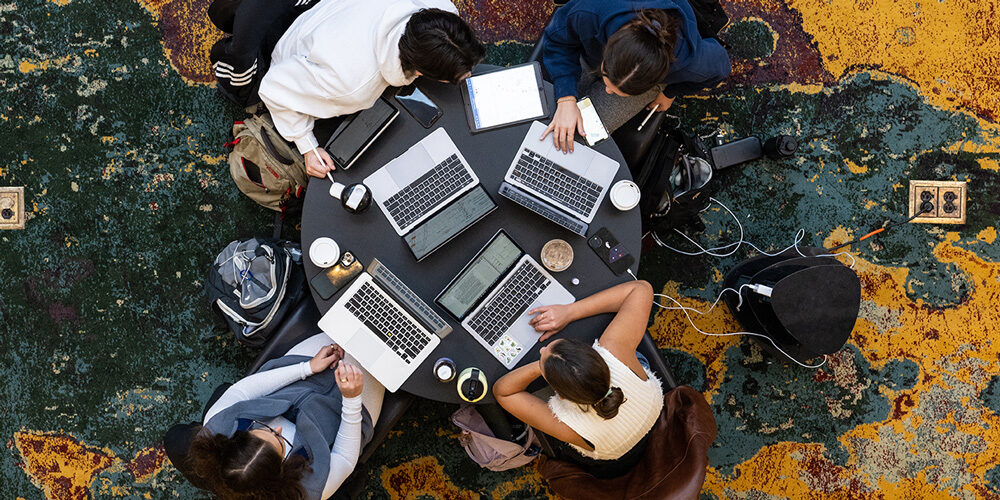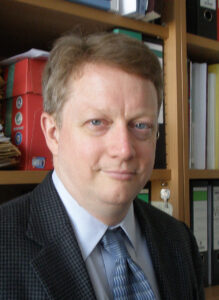Clickbait quagmire
Americans today are bearing the brunt of a (mis)information overload.
They are turning to the Internet, social media, and increasingly, artificial intelligence to get details on just about everything. Googling has become a reflex action, and almost a pastime.
Have a medical complaint and want to self-diagnosis it? Need financial advice on the cheap? Trying to rewire your house, fix a broken furnace, save your marriage, or train a pandemic puppy?Without a doubt, there are dozens, maybe even hundreds, of websites, blogs, and videos that will provide answers or advice.
Often, people assume they, too, can become experts by relying on Google, TikTok, YouTube, Instagram, and social media postings to obtain limited, incomplete — or downright inaccurate — information on a topic.
Whether these consumers are savvy enough to separate clickbait from credible content is uncertain.
And that, says U-M Psychology Professor David Dunning, is a huge problem.
“These days people have lots of ideas about things, such as the safety of routine vaccines, how to handle their finances, and the impact of tariffs, but they have not had classes in bioscience, personal finance, or global economics,” says Dunning. He is the Mary Ann and Charles R. Walgreen, Jr., Professor of the Study of Human Understanding
“Whatever the topic is, there are people who are well-informed, people who are uninformed, and people who are misinformed,” he says. “This mismatch between what you think you know and what you actually know is always relevant.”
Insufficient insight
In the 1990s, Dunning and his colleague, Justin Kruger of Cornell University, conducted their initial studies to determine how much insight people had when they were saying things that were mistaken, outrageous, and just plain wrong.
“As it turned out, they did not have much insight at all,” Dunning says. “In 1999, we published our results, which became known as the Dunning-Kruger Effect.”
Over the past 25 years, his ongoing research in numerous realms — medicine, education, biological safety, security, and most recently, AI — has shed more light on this human condition.
“We’ve found that people who are not knowledgeable tend not to know how unknowledgeable they are,” Dunning explains. “This is true of people who own guns, or are chess players or medical technicians or who view the news on the Internet and decide whether it is real or fake.
“Wherever you look, you’ll find that people who lack expertise also lack the expertise to know just how much expertise they lack,” he adds. “That’s the heart of the Dunning-Kruger Effect.”
In the Q&A that follows, Dunning weighs in on the pitfalls of today’s unpredictable information landscape and offers advice about where and how to obtain accurate information from authoritative sources.
How can we find information that is truly trustworthy?
One of the skills you need is the ability to filter and curate information, which is unregulated and may be good, bad, or fraudulent. You also need to do your own fact-checking. Never stop at just one source. Consult multiple sources and find out who is funding their data.
Look for credible organizations with solid, long-term reputations, such as state governments, medical schools, and nonprofit organizations. Check to see whether there is consensus among these multiple sources.
Watch out for online influencers who are trying to misinform or polarize others by playing on negative emotions, such as anger and fear, or by discrediting reliable sources, or by impersonating real authorities.
What about AI? Does it suffer from the Dunning-Kruger Effect, too?
The answer is yes, with a few exceptions. Here’s an example. When I asked OpenAI’s ChatGPT to tell me how to get from Ann Arbor to Cashmere, Oregon, it gave me not one, but two, routes. The problem is, there is no such place as Cashmere, Oregon. ChatGPT is designed to give you an answer. It is not designed to figure out whether that answer is the right answer. So, it shows overconfidence in the same patterns that humans do.
How can we accurately assess the outer limits of our expertise?
Everyone has an area where they are competent, but the question is: Do they know the boundary of their competence? That is what we are working on right now. One of the things we have discovered is that education initially makes you smarter, but then you start having overly expansive views of your circle of competence.In my Psychology and Law course, we surveyed students at the beginning of class about their knowledge of legal terminology, and they knew some of the terms. At the end of the course, we repeated the survey. This time, the students knew more legal terms, but they also claimed to know bogus terms that did not exist because we made them up.
When people claim knowledge of something that doesn’t exist, we call it overclaiming. This is an issue in education. It trains you to know more stuff, but it does not necessarily train you to know what you know versus what you don’t know.
Sir Arthur Conan Doyle once wrote: “Mediocrity knows nothing higher than itself, but talent instantly recognizes genius.” Savvy business people realize that the key to success is knowing what you know and what you don’t know, and being able to hire the right experts to cover what you don’t know.
How can we identify our own biases?
If we knew about our biases, we would not have any. Emily Pronin, a psychologist at Princeton University, says we have a “bias blind spot.” In other words, we see biases in others, but not in ourselves.
When things really matter, I suggest people get advice and feedback from family members, friends, and others who are knowledgeable. They can see when your biases are being triggered and you are making mistakes. Do the same favor for them. Mentors are also valuable sources of feedback. They can see the errors, because they have also lived the errors.
How do you deal with people in leadership positions who lack expertise and overestimate their competence?
Some people simply don’t know the limits of their expertise. If you explain things to them, they may be grateful for your feedback and happy to improve. Other people are dead-set on their perceived level of competence and are incensed if you tell them any differently.
If you are giving others feedback, don’t wait until you are really mad or in a high-stakes situation. Make feedback more frequent and low-stakes. Talk about people’s concrete behaviors and the specific effects their actions had. Not about their character or personality.
If you find yourself arguing or being offended by someone else’s feedback, wait a few days and think about it.
We are all in a hurry, but knowing yourself is very hard. It is a long-term project that requires people working together collectively to achieve it.
(Lead image in the Davidson Winter Garden at Michigan Ross: Michigan Photography.)





Debra Kuptz - 1983
Insight article and so on point for the day with respect to checking the facts. The “and who is funding them” being a reminder we don’t hear enough. Sir AC Doyle’s quote quite on point as well.
Reply
Charles Tommasulo - MSW ‘79. MPA ‘85
Always enjoy reading Professor David Dunning. I see the Dunning-Kruger Effect is alive and well!
Reply
Perry Clark - 1972, 1982
This is an excellent article, thank you for publishing it. As a former reporter who did a brief stint at The Michigan Daily, I can tell you that people don’t always want to know the truth. They want to see/hear/read information that supports what they want to be true, not necessarily what is true. That makes them easily susceptible to confirmation bias and motivated reasoning, especially when you add in the Dunning-Kruger effect. They don’t know what they don’t know, and often don’t care. Thank you again for this article.
Reply
Lana Che
Excellent topic for the times. I have to save it to give it a proper full read.
Thanks for the post.
Reply